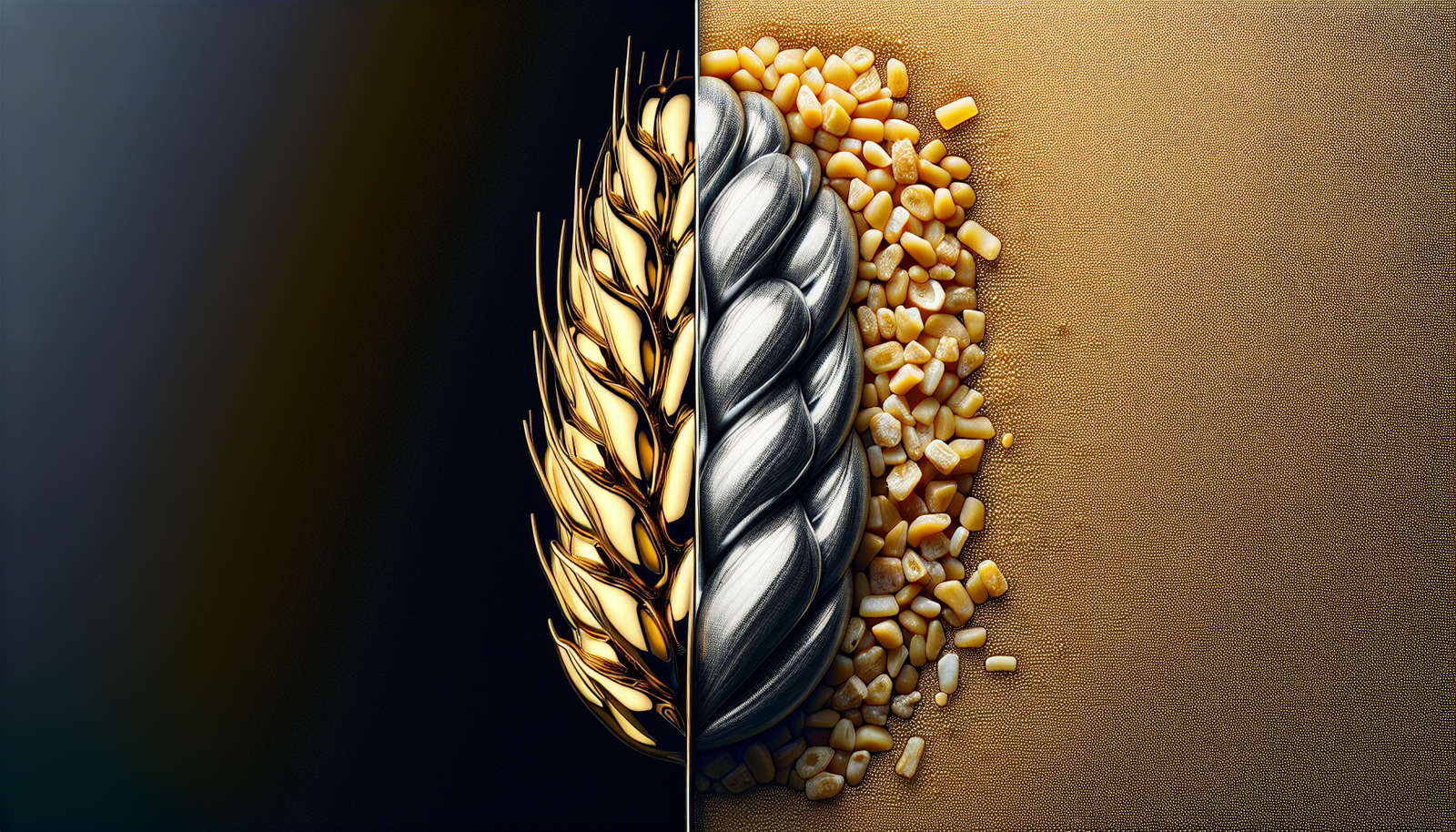If you’ve ever wondered about the difference between refined and unrefined carbohydrates, look no further. This article will provide you with a clear understanding of these two types of carbohydrates and how they impact your health. From the processing methods to their effects on the body, you’ll gain invaluable knowledge that will help you make informed choices when it comes to your diet. So, let’s unravel the mystery of refined and unrefined carbohydrates and discover which ones are best for your overall well-being.
Benefits of Carbohydrates
Importance of carbohydrates in the diet
Carbohydrates are an essential macronutrient that should be included in your diet for several reasons. They are your body’s primary source of energy, providing fuel for your brain, muscles, and other organs to function optimally. Carbohydrates are also necessary for supporting physical activity and exercise performance. Additionally, certain types of carbohydrates, such as fiber, play a crucial role in digestive health and help regulate blood sugar levels.
How carbohydrates provide energy
Carbohydrates are broken down into glucose, a simple sugar that can be readily absorbed by your body. Glucose is then transported to your cells, where it is either used for immediate energy or stored as glycogen in the liver and muscles for later use. When you need energy, your body can quickly convert glycogen back into glucose to meet your energy demands. This process ensures that you have a steady supply of energy throughout the day.
Role of carbohydrates in brain function
Carbohydrates are particularly important for brain function. The brain relies heavily on glucose as its primary source of energy. When your blood sugar levels drop, your brain may not function optimally, leading to decreased cognitive performance and difficulty concentrating. Including carbohydrates in your diet can help maintain stable blood sugar levels and support optimal brain function.
Refined Carbohydrates
Definition of refined carbohydrates
Refined carbohydrates have gone through a processing method that removes the bran and germ, stripping them of their natural fiber, vitamins, and minerals. This process also results in a finer texture and longer shelf life. Refined carbohydrates are typically found in foods made with white flour or added sugars.
Examples of refined carbohydrates
Common examples of refined carbohydrates include white bread, white rice, pasta made from refined flour, pastries, sugary cereals, and sugary drinks. These foods have been heavily processed, which removes many essential nutrients found in their unrefined counterparts.
Processing methods of refined carbohydrates
The processing methods of refined carbohydrates involve removing the fibrous outer layer of grains, which eliminates the majority of the fiber content. This process also removes important vitamins, minerals, and other beneficial compounds present in the bran and germ. Refined carbohydrates are often treated with chemicals and additives to improve their appearance, texture, and taste.

Negative Effects of Refined Carbohydrates
Impact of refined carbohydrates on blood sugar levels
Refined carbohydrates have a high glycemic index, meaning they are quickly digested and cause a rapid increase in blood sugar levels. This spike in blood sugar is soon followed by a sharp drop, leading to feelings of fatigue, hunger, and cravings for more sugary foods. Consistently consuming high amounts of refined carbohydrates can disrupt blood sugar regulation and increase the risk of developing type 2 diabetes.
Association of refined carbohydrates with obesity
Refined carbohydrates can contribute to weight gain and obesity. Due to their high glycemic index, they can stimulate the release of insulin, a hormone involved in storing excess glucose as fat. Additionally, refined carbohydrates are often calorie-dense and lack the satiety factor provided by fiber and other nutrients found in unrefined carbohydrates. This can lead to overeating and an increased risk of obesity.
Effects of refined carbohydrates on cardiovascular health
A diet high in refined carbohydrates has been associated with an increased risk of developing cardiovascular diseases such as heart disease and stroke. Studies have found that diets rich in refined carbohydrates can raise triglyceride levels, decrease levels of beneficial HDL cholesterol, and promote the development of insulin resistance, inflammation, and high blood pressure – all risk factors for heart disease.
Unrefined Carbohydrates
Definition of unrefined carbohydrates
Unrefined carbohydrates, also known as whole carbohydrates, are minimally processed and retain their natural fiber, vitamins, minerals, and other beneficial compounds. They offer a more nutrient-dense option compared to their refined counterparts.
Examples of unrefined carbohydrates
Unrefined carbohydrates include whole grains like quinoa, brown rice, oats, and whole wheat bread. Legumes, fruits, vegetables, and nuts also fall into this category. These foods are typically less processed and retain more of their original nutrients, offering a variety of health benefits.
Nutritional value of unrefined carbohydrates
Unrefined carbohydrates are rich in fiber, vitamins, minerals, and antioxidants. The high fiber content promotes healthy digestion, helps regulate blood sugar levels, and contributes to a feeling of fullness and satiety. Whole grains and unrefined carbohydrates are also more nutrient-dense, providing essential nutrients like B vitamins, iron, and magnesium.

Advantages of Unrefined Carbohydrates
Impact of unrefined carbohydrates on blood sugar levels
Unlike refined carbohydrates, unrefined carbohydrates have a lower glycemic index, resulting in a slower and more gradual release of glucose into the bloodstream. This helps maintain stable blood sugar levels, preventing energy crashes and reducing the risk of developing insulin resistance and type 2 diabetes.
Role of unrefined carbohydrates in weight management
Unrefined carbohydrates, especially those rich in fiber, can aid in weight management. Fiber adds bulk to your diet and promotes feelings of fullness, reducing the likelihood of overeating. Additionally, the slower digestion of unrefined carbohydrates helps regulate appetite and prevent sudden spikes and drops in blood sugar levels, which can lead to cravings and overeating.
Benefits of unrefined carbohydrates for heart health
Unrefined carbohydrates have been linked to a lower risk of heart disease. Their higher fiber content helps reduce unhealthy LDL cholesterol levels, lower blood pressure, and improve overall cardiovascular health. Including whole grains, fruits, vegetables, and legumes in your diet can help protect against heart disease and promote a healthy heart.
Glycemic Index and Carbohydrates
Understanding the glycemic index
The glycemic index (GI) is a measure of how quickly a carbohydrate-containing food raises blood sugar levels. Foods with a high glycemic index cause a rapid spike in blood sugar, while foods with a low glycemic index are digested more slowly, causing a slower and more controlled rise in blood sugar levels.
Differentiating between high and low glycemic foods
High glycemic foods include refined carbohydrates like white bread, white rice, and sugary snacks. These foods are quickly digested, leading to rapid spikes and drops in blood sugar levels. Low glycemic foods, on the other hand, include unrefined carbohydrates like whole grains, legumes, fruits, and vegetables. These foods are digested more slowly, providing a steady release of glucose and maintaining stable blood sugar levels.
Impact of refined and unrefined carbohydrates on glycemic index
Refined carbohydrates generally have a higher glycemic index compared to unrefined carbohydrates. The refining process removes the fiber and other components that slow down digestion and absorption. As a result, refined carbohydrates are rapidly converted to glucose, causing a sharp rise in blood sugar. Including more unrefined carbohydrates in your diet can help balance blood sugar levels and reduce the risk of metabolic disorders.
Balancing Carbohydrate Intake
Recommended daily carbohydrate intake
The recommended daily carbohydrate intake varies depending on factors such as age, sex, activity level, and overall health. However, on average, carbohydrates should make up around 45-65% of your total daily calorie intake. It’s essential to choose the right types of carbohydrates to ensure you’re getting the necessary nutrients and maintaining stable blood sugar levels.
Choosing the right types of carbohydrates
When it comes to choosing carbohydrates, opt for unrefined sources whenever possible. Include whole grains, such as brown rice, quinoa, and whole wheat bread, as well as fruits, vegetables, legumes, and nuts. These options are nutrient-dense, provide essential vitamins and minerals, and contain fiber, which aids digestion and promotes feelings of fullness.
Incorporating a variety of carbohydrates in the diet
To obtain the maximum benefits from carbohydrates, it’s important to incorporate a variety of sources into your diet. This ensures you’re receiving a wide range of essential nutrients and prevents monotony in your meals. Mix whole grains, fruits, vegetables, legumes, and nuts to create a well-balanced and nutritious diet.
Carbohydrates and Exercise
Importance of carbohydrates for exercise performance
Carbohydrates are crucial for exercise performance. During physical activity, your muscles use glycogen as their primary fuel source. Consuming an adequate amount of carbohydrates before and during exercise helps maintain glycogen stores and provides a readily available source of energy. Without enough carbohydrates, you may experience fatigue, reduced strength and endurance, and an overall decrease in performance.
Timing carbohydrate intake for optimal results
To optimize exercise performance, it’s important to time your carbohydrate intake properly. Consuming a carbohydrate-rich meal or snack 1-3 hours before exercise can help ensure you have enough glycogen stored for fuel. During longer workouts or intense exercise sessions lasting more than 60 minutes, consuming carbohydrates in the form of sports drinks or energy gels can provide an additional source of energy to sustain performance.
Refined vs. unrefined carbohydrates for athletic performance
While both refined and unrefined carbohydrates can provide energy for athletic performance, unrefined carbohydrates offer additional benefits. Whole grains, fruits, and vegetables provide more sustained energy due to their higher fiber content, slower digestion, and lower glycemic index. Additionally, these unrefined sources offer a greater variety of vitamins, minerals, and antioxidants, which support overall health and recovery.
Making Healthy Carbohydrate Choices
Reading food labels for carbohydrate content
To make healthy carbohydrate choices, it’s important to read food labels and be mindful of the carbohydrate content. Look for products that contain whole grains, fruits, vegetables, and legumes. Be cautious of foods labeled as “low fat” or “diet,” as they may contain high amounts of added sugars or refined carbohydrates to compensate for the reduced fat content.
Identifying refined and unrefined carbohydrate sources
To identify refined and unrefined carbohydrate sources, examine the ingredients list. Whole grains, such as whole wheat, brown rice, and oats, should be listed as the first ingredient. Avoid foods that list refined flours, white sugars, or high-fructose corn syrup as primary ingredients. Additionally, foods high in fiber are a good indicator of unrefined carbohydrates.
Tips for reducing refined carbohydrate consumption
Reducing refined carbohydrate consumption can be achieved by making a few simple changes to your diet. Swap white bread for whole grain options, like whole wheat or sprouted bread. Choose brown rice or quinoa instead of white rice, and opt for whole grain pasta over the refined alternative. Gradually decrease your intake of sugary snacks, pastries, and sugary drinks, replacing them with whole fruits, nuts, or homemade snacks.
Conclusion
Understanding the difference between refined and unrefined carbohydrates is essential for making informed decisions about your diet. Refined carbohydrates may be convenient and delicious, but they lack the nutrients and fiber found in unrefined carbohydrates. By choosing unrefined carbohydrates, such as whole grains, fruits, vegetables, and legumes, you can enjoy the benefits of sustained energy, improved blood sugar control, weight management, and a reduced risk of chronic diseases. Remember to balance your carbohydrate intake, time them appropriately for exercise, and make healthy carbohydrate choices by reading food labels and opting for unrefined sources whenever possible. Incorporate a variety of carbohydrates into your diet, and you’ll be well on your way to a balanced, nutritious, and satisfying lifestyle.

